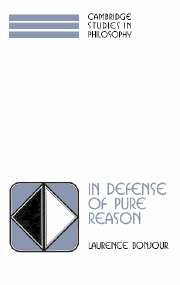Book contents
- Frontmatter
- Contents
- Preface
- Acknowledgments
- 1 Introduction: the problem of a priori justification
- 2 In search of moderate empiricism
- 3 Quine and radical empiricism
- 4 A moderate rationalism
- 5 Epistemological objections to rationalism
- 6 Metaphysical objections to rationalism
- 7 The justification of induction
- Appendix: Non-Euclidean geometry and relativity
- References
- Index
1 - Introduction: the problem of a priori justification
Published online by Cambridge University Press: 08 January 2010
- Frontmatter
- Contents
- Preface
- Acknowledgments
- 1 Introduction: the problem of a priori justification
- 2 In search of moderate empiricism
- 3 Quine and radical empiricism
- 4 A moderate rationalism
- 5 Epistemological objections to rationalism
- 6 Metaphysical objections to rationalism
- 7 The justification of induction
- Appendix: Non-Euclidean geometry and relativity
- References
- Index
Summary
THE NEED FOR THE A PRIORI
Perhaps the most pervasive conviction within the Western epistemological tradition is that in order for a person's belief to constitute knowledge it is necessary (though not sufficient) that it be justified or warranted or rationally grounded, that the person have an adequate reason for accepting it. Moreover, this justifying reason must be of the right sort: though one might accept a belief for moral reasons or pragmatic reasons or religious reasons or reasons of some still further sort and be thereby in a sense justified, such reasons cannot satisfy the requirements for knowledge, no matter how powerful, in their own distinctive ways, they may happen to be. Knowledge requires instead that the belief in question be justified or rational in a way that is internally connected to the defining goal of the cognitive enterprise, that is, that there be a reason that enhances, to an appropriate degree, the chances that the belief is true. Justification of this distinctive, truth-conducive sort will be here referred to as epistemic justification.
Historically, most epistemologists have distinguished two main sources from which the epistemic justification of a belief might arise. It has seemed obvious to all but a very few that many beliefs are justified by appeal to one's sensory (and introspective) experience of the world.
- Type
- Chapter
- Information
- In Defense of Pure ReasonA Rationalist Account of A Priori Justification, pp. 1 - 27Publisher: Cambridge University PressPrint publication year: 1997



